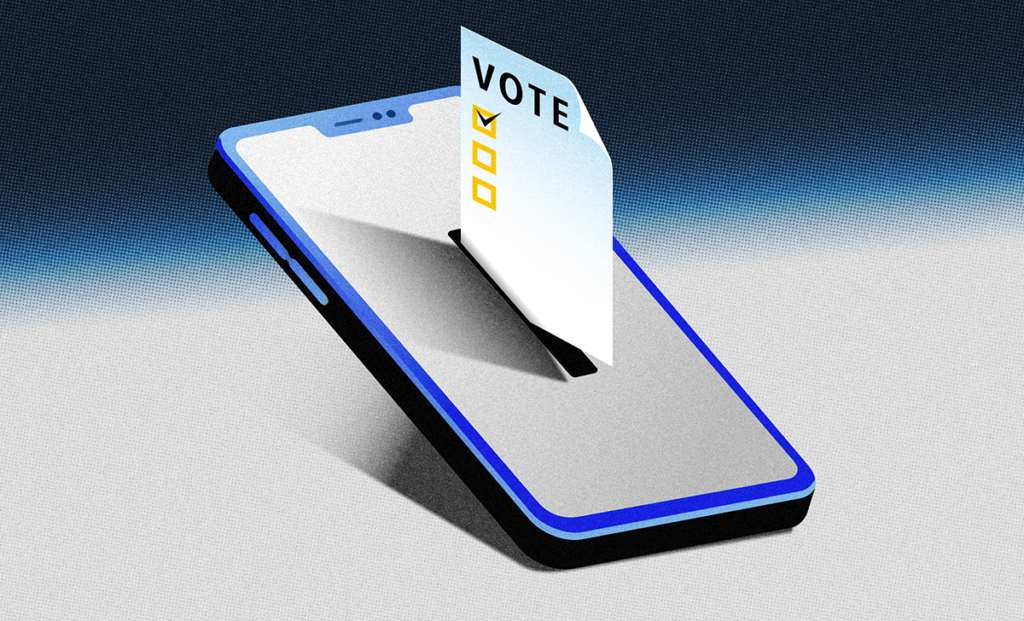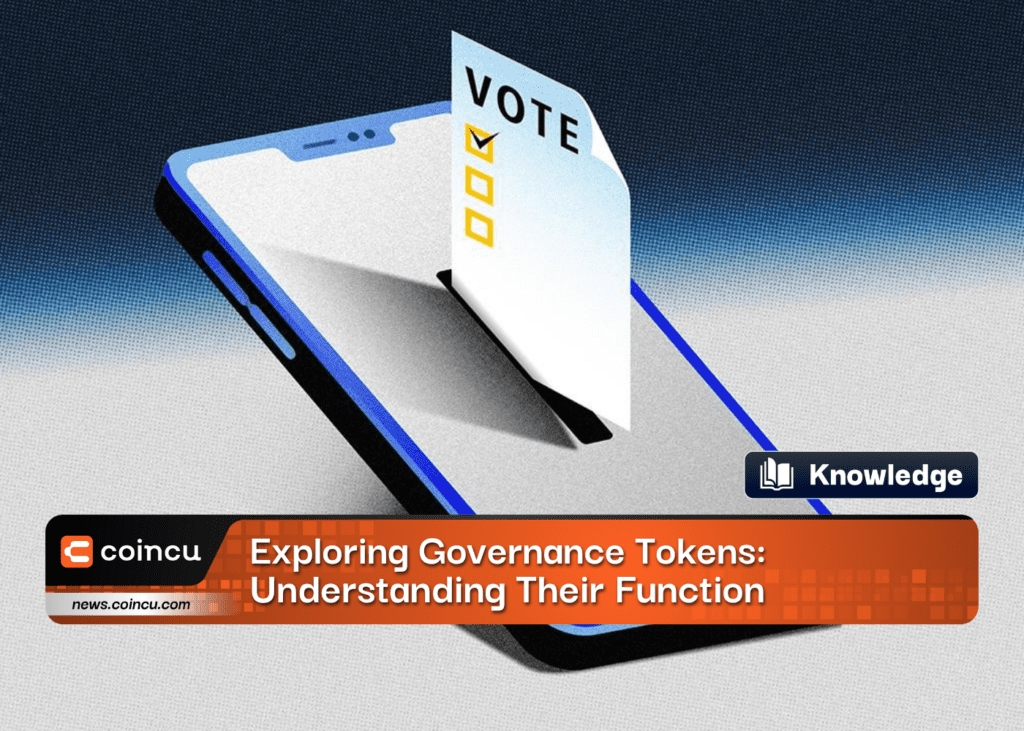In the realm of decentralized finance (DeFi), governance tokens have gained prominence as powerful tools that enable token holders to actively participate in the decision-making processes of a decentralized protocol or platform. These tokens grant individuals voting rights, allowing them to influence protocol upgrades, parameter adjustments, and other governance-related activities. This research delves into the concept of governance tokens, their role within decentralized systems, and the mechanisms that govern their functionality.

Understanding Governance Tokens
Governance tokens are digital assets that grant holders the ability to participate in the governance and decision-making processes of a decentralized protocol or platform. These tokens are typically distributed to participants as incentives, often during token sales or through liquidity mining programs. Unlike traditional cryptocurrencies, governance tokens are not primarily designed as mediums of exchange or stores of value; instead, their primary purpose is to facilitate collective decision-making within a decentralized ecosystem.
Governance Token Functions
Governance tokens serve several key functions within decentralized protocols and platforms. Let’s explore these functions in more detail:
- Voting Rights: The primary function of governance tokens is to grant holders the ability to vote on proposals and decisions related to the protocol or platform. Token holders can participate in the decision-making process by casting their votes on various governance matters such as protocol upgrades, parameter adjustments, fee structures, funding allocations, or changes to the platform’s rules. Each token typically represents a single vote, and the voting power is proportional to the number of tokens held by an individual. This allows token holders to have a say in the direction and evolution of the decentralized ecosystem.
- Governance Participation: Governance tokens incentivize active participation from token holders in shaping the governance of the protocol or platform. By holding governance tokens, individuals become stakeholders with a vested interest in the success and development of the ecosystem. This encourages token holders to actively engage in discussions, propose ideas, and provide feedback on governance-related matters. The goal is to create a sense of ownership and community involvement, ensuring that decisions align with the interests and values of the token holders.
- Incentives and Rewards: In addition to voting rights, governance tokens often offer incentives and rewards to encourage token holders’ active participation in the governance process. These incentives can come in various forms, such as additional governance tokens, fees generated by the protocol, or other tokens within the ecosystem. By providing rewards, protocols aim to incentivize token holders to contribute their time, expertise, and resources to improve the ecosystem’s governance. This helps in attracting and retaining active participants, fostering a vibrant and engaged community.
- Protocol Evolution and Upgrades: Governance tokens play a crucial role in driving the evolution and upgrades of decentralized protocols and platforms. Token holders have the power to propose changes and improvements to the system, ensuring that the protocol remains adaptable and responsive to the needs of its users. Through voting, token holders can approve or reject proposed upgrades, determining which changes are implemented. This enables a decentralized and collective decision-making process, where the community of token holders actively shapes the development roadmap of the protocol.
- Governance Efficiency and Flexibility: Governance tokens allow for efficient decision-making and flexibility in the governance process. Traditional centralized systems often suffer from slow and bureaucratic decision-making, whereas decentralized governance enables quicker and more agile decision-making. With governance tokens, voting can occur in a relatively short timeframe, enabling prompt responses to emergent issues or opportunities. Additionally, the flexibility of governance tokens allows for parameter adjustments, fine-tuning of protocols, and addressing potential vulnerabilities in a timely manner, making decentralized ecosystems more resilient.
- Community Empowerment: Governance tokens empower the community of token holders by giving them a voice and influence over the protocol’s direction. This sense of empowerment helps in building a strong and engaged community, fostering trust and collaboration among participants. By actively involving token holders in decision-making, governance tokens contribute to decentralized governance models that prioritize inclusivity and consensus-building.
Governance Token Mechanisms
Governance token mechanisms play a vital role in enabling effective and transparent decision-making within decentralized protocols and platforms. Let’s explore some of the key mechanisms involved:
- Voting Proposals: Governance token holders can propose changes, upgrades, or decisions related to the protocol or platform. Proposals are typically submitted in a structured format, including details about the proposed change, its rationale, potential benefits, and any associated risks. This mechanism allows token holders to actively contribute to the governance process by initiating discussions and suggesting improvements.
- Voting Periods: Governance protocols define specific voting periods during which token holders can cast their votes on proposed changes. The duration of voting periods can vary, depending on the protocol’s design and the complexity of the proposal. Token holders must cast their votes within the designated period for their votes to be counted. This mechanism ensures that all token holders have an equal opportunity to participate and voice their opinions.
- Quorum and Thresholds: To ensure the legitimacy of voting outcomes, governance protocols often require a minimum level of participation known as a quorum. A quorum represents the minimum number of tokens that must be cast in a vote for it to be considered valid. It prevents decisions from being made with insufficient token holder participation. Additionally, some protocols establish threshold requirements, where a certain percentage of votes must be in favor of a proposal for it to be approved or implemented. Thresholds help ensure that decisions have sufficient consensus before being enacted.
- Delegated Voting: Some governance protocols allow token holders to delegate their voting rights to trusted individuals or entities. Delegated voting mechanisms enable token holders who may not actively participate in the governance process to still have their votes counted by delegating their voting power to a representative or delegate. This allows for more widespread token holder participation and representation in the decision-making process.
- Vote Weighting: In some governance systems, vote weighting mechanisms may be implemented to account for differences in token holdings. This means that the voting power of token holders may vary based on the number of tokens they hold. For example, a holder with a larger stake may have proportionally more voting power than a smaller holder. Vote weighting mechanisms aim to strike a balance between ensuring fair representation and preventing a concentration of power in the hands of a few large token holders.
- Proposal Execution: Once a voting period concludes and a proposal receives the necessary votes, the protocol or platform implements the approved changes or decisions. The implementation can involve executing smart contracts, updating protocol parameters, or incorporating new features into the system. Transparency and accountability are maintained by ensuring that the execution of proposals aligns with the voting outcomes.
- Timelocks and Governance Delay: To mitigate potential risks and provide a buffer for oversight, some governance systems incorporate timelocks and governance delay mechanisms. Timelocks introduce a delay period between the voting outcome and the execution of the proposal, allowing token holders to review and potentially challenge the decision if necessary. Governance delay mechanisms provide an additional layer of security and ensure that rushed or controversial decisions can be thoroughly examined before implementation.
Challenges and Considerations
While governance tokens offer exciting possibilities for decentralized decision-making, there are several challenges and considerations that need to be addressed. These challenges include:
- Token Concentration: Governance tokens may suffer from token concentration, where a few large token holders possess significant voting power. This concentration could potentially lead to centralization of decision-making and diminish the influence of smaller token holders. Protocols and platforms must carefully consider measures to address this challenge and ensure a fair and inclusive governance system. Mechanisms like vote weighting or quadratic voting can be explored to balance voting power among token holders.
- Participation and Engagement: Despite the opportunity for governance participation, achieving high levels of active engagement from token holders remains a challenge. Encouraging widespread participation requires effective communication, education, and incentive mechanisms to motivate token holders to actively participate in the governance process. Community outreach, user-friendly interfaces, and reward mechanisms can be implemented to increase engagement and involvement.
- Governance Attacks: Governance systems are not immune to governance attacks, where malicious actors attempt to manipulate voting outcomes for personal gain. Such attacks can include vote buying, collusion, or manipulation of token holdings. Implementing robust security measures and ensuring transparent governance processes are vital to protect the integrity of the governance system. Auditing mechanisms and decentralized identity solutions can help detect and prevent potential attacks.
- Decision-Making Efficiency: Balancing the need for community participation and efficient decision-making can be a challenge. While decentralized governance aims to incorporate diverse perspectives and opinions, it can sometimes lead to slow decision-making processes. Protocols should strive to strike a balance between inclusivity and efficiency, employing mechanisms like delegated voting, timelocks, and quorum requirements to ensure that decisions are made in a timely manner while still considering the input of the community.
- Regulatory Compliance: As governance tokens gain prominence, regulatory compliance becomes a critical consideration. Depending on the jurisdiction, governance tokens may be subject to securities laws or other regulatory frameworks. Protocols and platforms must navigate these legal requirements to ensure that governance processes are compliant and transparent, avoiding potential legal risks or penalties.
- Upgradability and Long-Term Sustainability: Governance tokens need to address the challenge of balancing upgradability and long-term sustainability. As protocols evolve, there is a need for governance mechanisms that enable efficient upgrades and improvements while maintaining the integrity of the system. Ensuring a smooth transition from one version to another, addressing backward compatibility, and considering the long-term interests of the ecosystem are crucial aspects for sustainable governance.
Conclusion
Governance tokens have emerged as powerful tools that enable decentralized decision-making within protocols and platforms. By granting voting rights and encouraging active participation, governance tokens empower token holders to shape the direction and future of decentralized ecosystems. The mechanisms governing these tokens, including voting proposals, voting periods, quorums, and thresholds, play a crucial role in ensuring transparency and fairness. However, challenges related to token concentration, participation, and potential governance attacks need to be addressed to foster truly inclusive and effective governance systems. As the decentralized finance space continues to evolve, governance tokens are likely to play an increasingly important role in shaping the future of decentralized protocols and platforms.
DISCLAIMER: The Information on this website is provided as general market commentary and does not constitute investment advice. We encourage you to do your own research before investing.
Join us to keep track of news: https://linktr.ee/coincu
Annie
Coincu News





